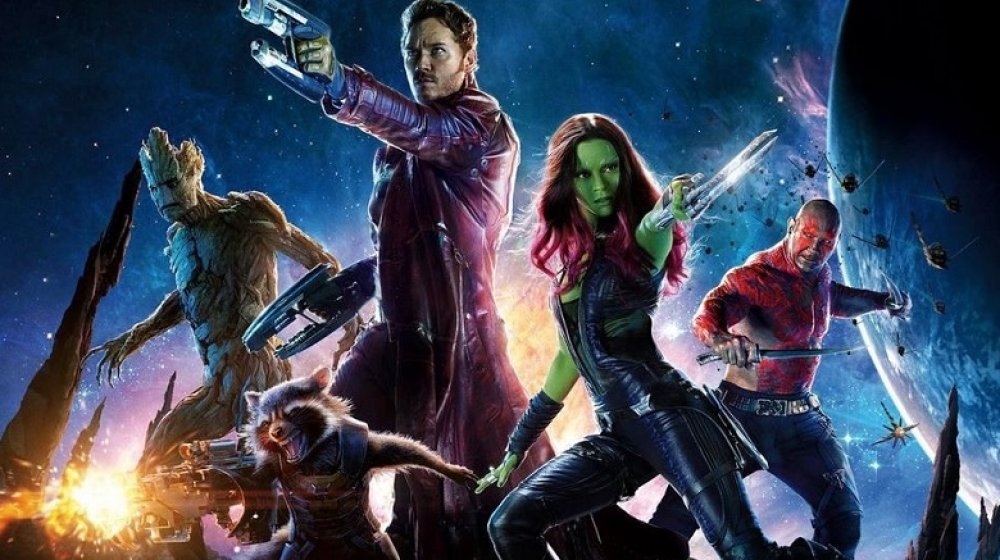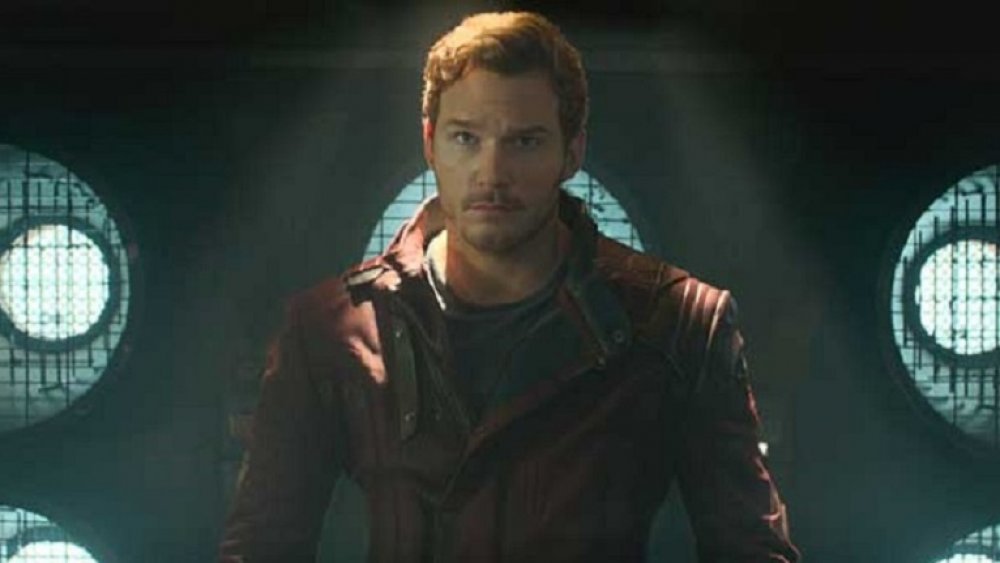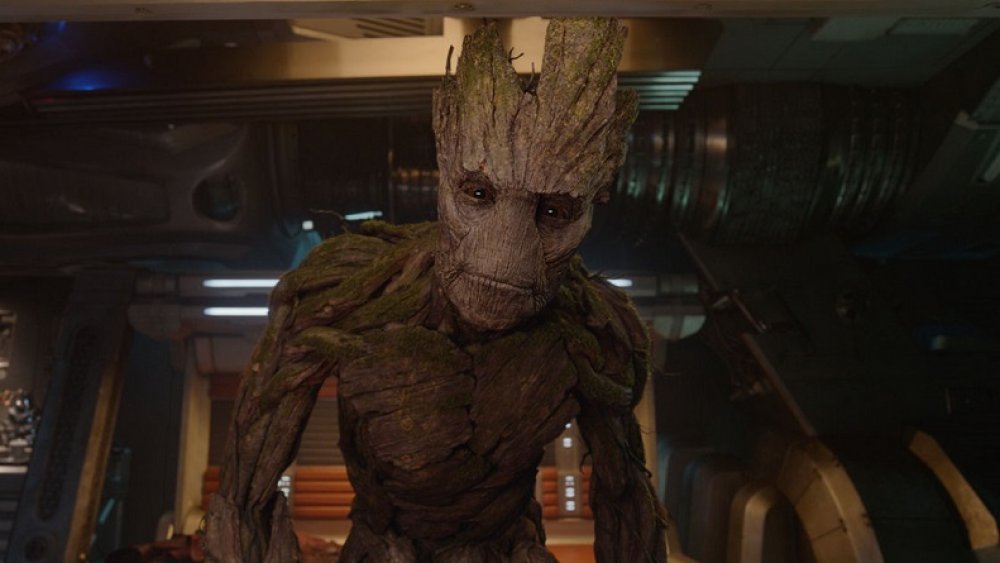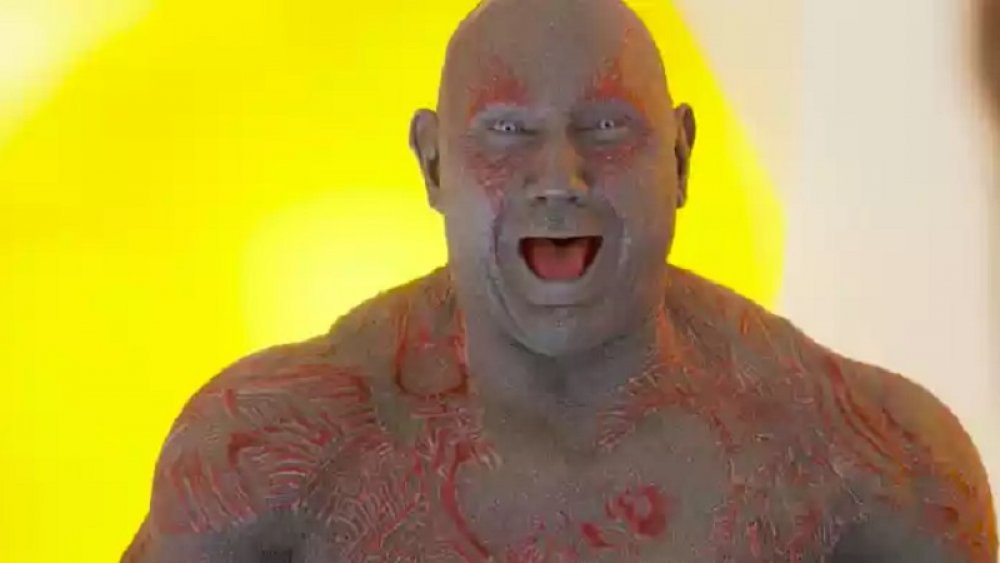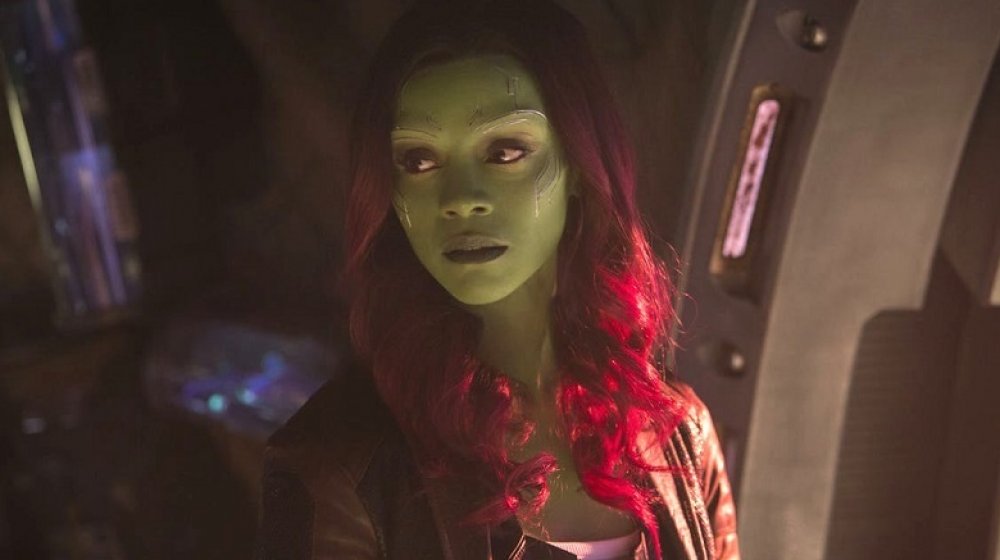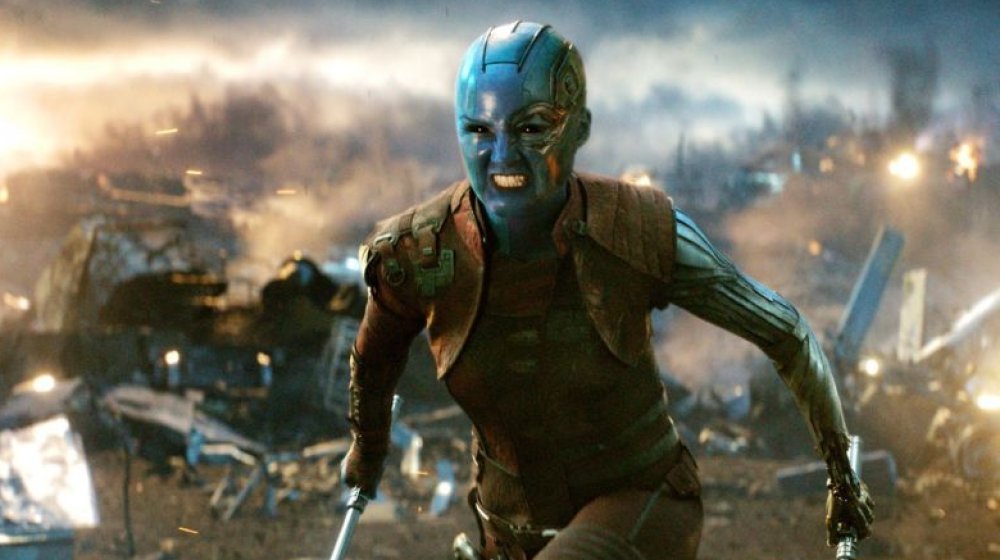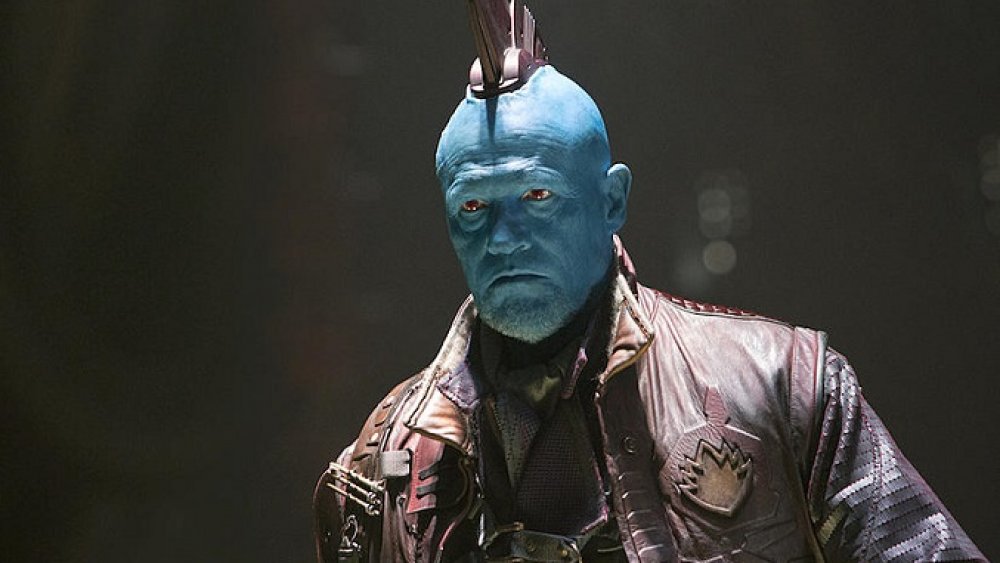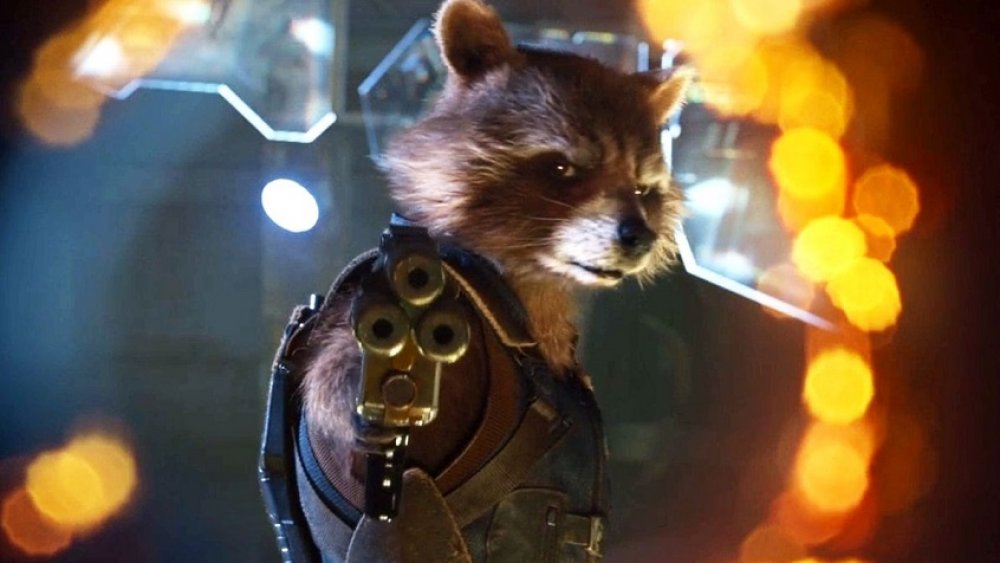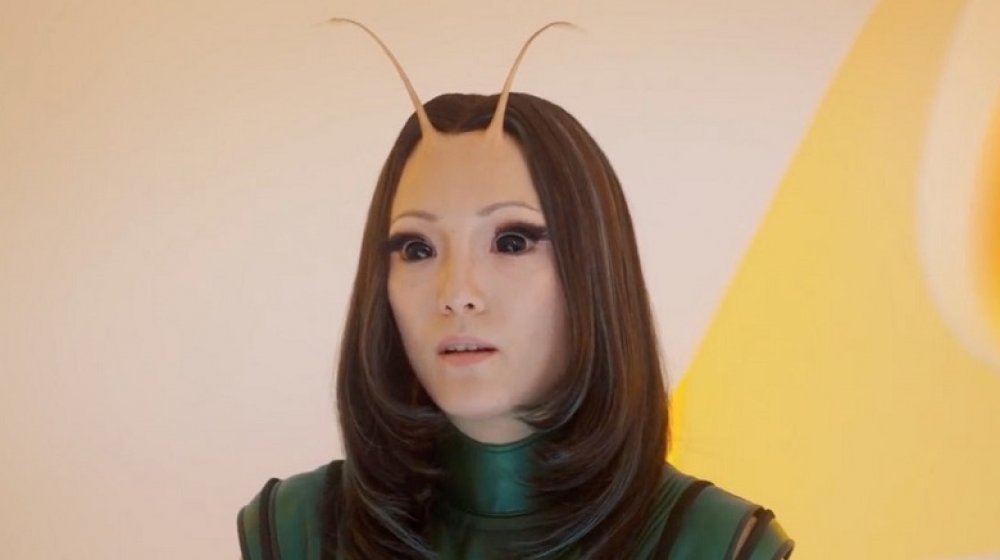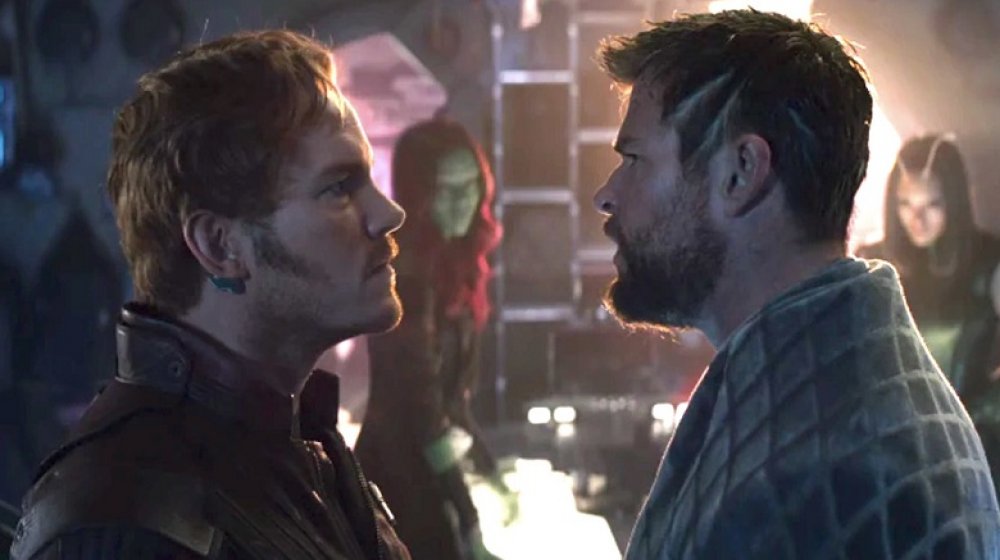The Biggest Weakness Of Every Guardian Of The Galaxy Explained
Guardians of the Galaxy was one of the Marvel Cinematic Universe's first big risks. The Guardians were fairly obscure, even by comics standards. Other than the presence of one of the Infinity Stones and the Collector, the film had no ties to anything else in the MCU. It takes place far beyond the familiar Marvel locales of New York City, the United States, and the Earth in general. But this plucky cast of characters defied the odds. Guardians drew a huge audience and made over $300 million dollars domestically and nearly $800 million worldwide. Its sequel was even more successful.
The key to Guardians' surprising success? Its heroes. They begin as a chaotic collection of misfits, and end up a strange, space-faring family, bound by their strengths as much as their weaknesses. Alone, their struggles are debilitating, but together, they can tackle them as a team. And boy, do they have some interesting weaknesses to counter: Fearsome fathers, genetic experimentation, and crippling inferiority complexes abound in this group of unlikely heroes. Today, we're examining those weaknesses one character at a time, from sibling rivalry to the trials of being a talking raccoon.
Star-Lord never grew up
Peter Quill is kidnapped by Yondu and his band of Ravagers right after he watches his mother die as a child. Growing up in the company of space pirates is as thrilling as it is terrifying, ultimately stranding him in a prolonged pseudo-adolescence. He gives himself the name "Star-Lord" in order to sound cool. His tastes and interests are static, as his entire cultural education is stuck on the "Awesome Mix" his mother left him. He is an eternal child of the 1980s, stranded among aliens who've never heard of Cyndi Lauper.
While all of this is endearing in its own weird way, less so is his underdeveloped emotional intelligence. Peter is incredibly insecure: He gets into fights with Rocket over who's the best pilot, becomes jealous of Thor, and puts personal satisfaction before the greater good consistently. Who can forget the moment in Avengers: Infinity War when he attacks Thanos out of grief for Gamora, giving the tyrant the opening he needs to escape?
But that's not all. To quote Gamora, Quill's "pelvic sorcery" leads him to seduce lots of different women of various alien races, all of whom he immediately forgets. Gamora catalyzes a change in this attitude, but really, he should have gotten there on his own.
Groot goes along with the crowd
Groot is introduced as Rocket's muscle and partner-in-crime. While the full extent of this giant tree creature's vocabulary is "I am Groot," he's actually a sensitive fellow. However, he seems perfectly happy to do what everyone else is doing, especially if it allows him a relatively easy life. The adult Groot in the first Guardians film is happy to take orders from Rocket, even when his furry friend criticizes him for being "asleep for the danger, awake for the money — as per usual!"
This makes Groot a useful teammate when he's motivated, but pretty useless when it comes to everything else. Groot isn't going to come up with plans, chart a new course, or even pay attention. Indeed, when Baby Groot is asked to find a particular item for Yondu, he brings back everything imaginable but the item, including a severed human toe.
The one time Groot thinks independently is when he sacrifices himself at the end of Guardians Of The Galaxy. He might not be a great thinker, planner, or leader, but he loves his adoptive family and will do anything for them.
Drax is too single-minded
Drax the Destroyer is a man of tremendous focus. When audiences meet him in the first Guardians film, all he wants is to kill Ronan the Accuser. Later, all he wants is to kill Thanos. A warrior from a planet of hardened brutes, he believes there's no problem that can't be solved with violence.
While his lack of nuance and intense literal-mindedness is hilarious, Drax's one-track mind gets him and the group into trouble on more than one occasion. Indeed, after the Guardians' plan to sell the Orb to the Collector goes awry, Drax responds by calling Ronan out and demanding a showdown. He has no plan, other than to stab Ronan repeatedly. This, to him, is not an impediment.
To Drax's credit, the beatdown he receives from Ronan does teach him to value his team. It doesn't change his approach to battle, however: He's still a stab-first-questions-later kind of guy. Sometimes this is useful, like when he fights Thanos' minions. Other times, it gets him eaten, like when he attacks the monstrous, energy-devouring Abilisk at the beginning of Guardians of the Galaxy Vol. 2. Even though Gamora winds up killing the creature, Drax still thinks he saved the day. He's learning — but he's likely always going to be a hard-headed, metaphor-bungling goofball with too many knives and too little caution.
Gamora is a den mother
Thanos raised Gamora to be the perfect killing machine. She grows up steeling herself against the need for affection, striving to become "the deadliest woman in the galaxy" above all else. She succeeds, but only at tremendous emotional cost.
When Gamora finally escapes Thanos and finds herself with the Guardians, it triggers a long-suppressed need for others. While she complains about having to deal with Quill and Rocket's adolescent antics, it's clear that she secretly delights in scolding them. The same is true of Baby Groot and even Drax. She doesn't just want to take care of them — Gamora wants them to behave.
The longer this goes on, the more she pours into the group. Being reunited with Nebula makes Gamora's new role obvious: She wants a big family to love and sacrifice for. It's clear she feels regret for treating Nebula poorly and wants to make up for it. It never even occurs to her that what Nebula seeks from her is love, and that all she has to do is be there for her.
The problem is that Gamora puts everything into her strange little family. She can't make Peter kill her when Thanos captures her. She can't bear to see Nebula tortured and gives up some key information. She goes from totally closed-off and selfish to totally open and self-sacrificing. That imbalance kills her, but she wouldn't have it any other way.
Nebula is desperate for approval
Thanos does one of the worst things a parent can do to Nebula and Gamora: He pits his daughters against each other, forcing them to fight for his approval. Nebula tends to come out the loser in these twisted games, and it scars her for life.
No matter what she does, Nebula can never defeat Gamora in combat. Every time she loses, Thanos takes her back into his workshop, "upgrading" her circuitry in order to make her tougher. Needless to say, it's a horrifying experience. All she wants to do is please her father and gain his approval. Instead, all she gets are upgrades and dangerous missions.
When she finally hunts down Gamora on Ego and beats her in a fight, Nebula celebrates like the little sister that she is. That's when she reveals that all she's ever really wanted was a sister. This moment frees her of the need to please Thanos — now, all she wants to do is kill him. In the aftermath of the Snap, Nebula turns to Tony Stark and, in the process of planning Thanos' demise, learns how to be a friend. Instead of killing to please her father, she learns how to play paper football and be a good sport. It's not a happy ending for the blue-skinned cyborg — it is instead her happy beginning.
Yondu can't admit mistakes
Yondu Udonta is a space pirate, once part of the larger Ravager network that terrorizes the galaxy. However, even Ravagers have a code: They can steal and sell anything except sentient beings, and they especially don't sell children.
Yondu takes a job with Ego, finding and retrieving the children Ego fathers across the galaxy. Eventually, Yondu realizes that Ego isn't seeking them out for a warm reunion, but to see if their life forces suit his megalomaniacal needs. Yondu captures young Peter Quill on Earth, but decides not to bring him to Ego. From Quill's perspective, Yondu kidnaps him, but in fact, the pirate was saving him from a terrible fate.
When the other Ravagers catch wind of what Yondu has done, they exile him. Instead of trying to find a way to redeem himself or tell Peter the truth, Yondu doubles down on being a scoundrel. Though he can never bring himself to kill Peter when he's betrayed by him, Yondu never tells him that he sees Peter as his son until it's nearly too late. Being unable to say he's sorry dooms him in the end, even if he manages to redeem himself.
Rocket pushes people away
Rocket might have the most tortured past of all the Guardians, and that's saying something. While his exact origin is not revealed, it is noted when he's arrested on Xandar that he was made through genetic and cybernetic experiments, all of which were horrifically painful. He puts on a brave face, but it is clear that his origins have affected him deeply.
Rocket puts up a gruff, wise-cracking exterior as a way of protecting himself from his own trauma and self-loathing. Even when the Guardians accept him, he still actively antagonizes them because of how much he hates himself. It slips out occasionally, like when he gets drunk and yells, "I didn't ask to be made! I didn't ask to be torn apart and put back together over and over, like some — some little monster!"
His need to push everyone away obscures the fact that Rocket is a fierce warrior, a brilliant engineer, an ace pilot, and a loyal friend. Yondu, a kindred spirit, is the one who calls him on this in a quiet moment, saying, "I know you play like you're the meanest and the hardest, but you're actually the most scared of all." Rocket pushes people away because every time he feels love and acceptance, he's reminded of how much he thinks he doesn't deserve it. Groot is the only one he really lets in, and even then, Rocket bosses him around.
Mantis doesn't stick up for herself
Mantis first appears as a servant of Ego, Peter Quill's father. Ego finds her in "larval" form and raises her to adulthood, availing himself of her empathic abilities. Mantis can detect emotions, and, to a certain degree, change them. In Ego's case, she is there to ease his mania and help him sleep.
Mantis knows that Ego is murdering his children as part of his plan to create one powerful enough to overrun the galaxy with his essence. However, she's too scared of Ego to tell the Guardians right away. Only her burgeoning friendship with Drax moves her to tell them what's really happening. This is an important moment in her development, but still a complex affair.
Plainly put, Mantis has no self-esteem and no social skills. Drax, in his blunt way, immediately refers to her as being horribly ugly. Later, he encourages her assumption that Rocket is a pet, and tells her to go ahead and pet him. This leads to Rocket trying to bite her and hysterical laughter from Drax. Mantis laughs as well in an effort to be liked.
In a group where ruthless mockery is the norm, Mantis instantly becomes an easy target. She's happy to absorb it, because the group accepts her, but hopefully she'll soon learn that she doesn't have to stand for such teasing just to enjoy the bonds of friendship.
Thor doesn't know what he wants
Avengers: Endgame leaves Thor's story notably unfinished. His world has been torn apart. His family and most of his friends are dead. Hela, his long-exiled sister, revealed uncomfortable truths about Asgard to him. He is changed by these experiences — but not, at first, for the better.
Even before Asgard's destruction, Thor had struggled with responsibility and leadership. Sure, he grows into his powers and royal bloodline, but he's still prone to rash decisions and despair. The events of Thor: Ragnarok and Avengers: Infinity War send him spiraling into drunkenness in an effort to block out his trauma and loss. It's an understandable reaction, and ultimately, he redeems himself by naming Valkyrie as the next leader of Asgard. But his underlying problems remain.
Thor currently has no real long-term goals. He can do anything, but he realizes, even after defeating Thanos, that he doesn't know what he wants to do. That's why he fits in so well with the Guardians: He's a screw-up trying to figure things out, just like them. Will he chart a new course alongside them? Hopefully, yes — so long as they keep him away from the beer.
